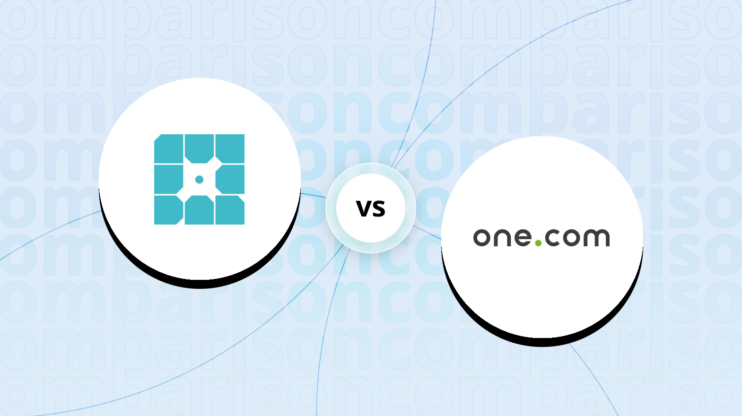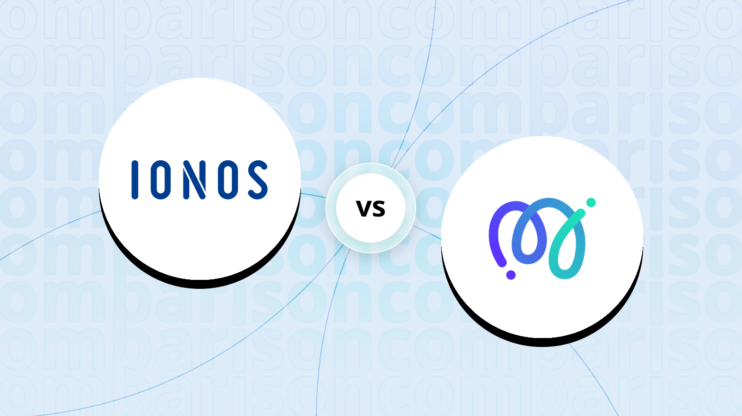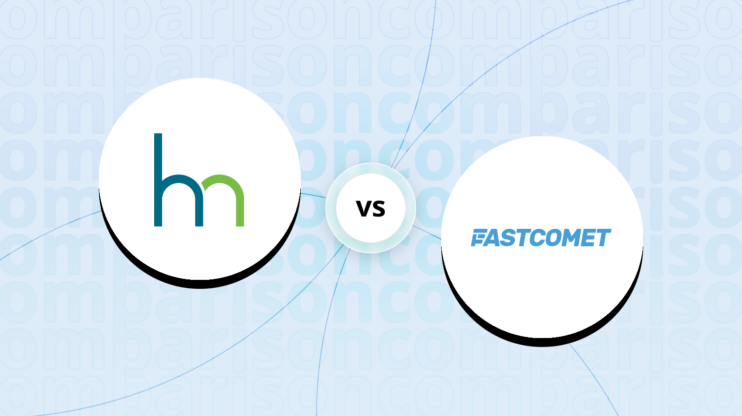Dreamhost vs StableHost: Final verdict
Comparing DreamHost vs. StableHost reveals distinctions in features, performance, and user-centric functionality that impact their overall value for different needs.
-
DreamHost (Overall grade: 8.2)
offers a versatile range of hosting plans, including Shared, VPS, Dedicated, and Cloud Hosting, which makes it well-suited for diverse user requirements. DreamHost excels in speed and scalability, benefiting from SSD storage and NGINX hosting, which ensure efficient performance. Its 100% uptime guarantee, user-friendly custom control panel, and comprehensive security features add further appeal. However, it occasionally faces variability in long-term uptime scores and lacks direct phone support, which can be a drawback for some users.
StableHost (Overall grade: 6.9)
is notable for its consistent performance and reliability, guaranteeing 99.9% uptime and using clustered hosting technology to avoid single points of failure. It offers strong reseller hosting options ideal for agencies, and features like multiple global server locations enhance its availability. Despite its strong security measures and competitive pricing, StableHost’s offerings are less comprehensive, particularly in high-traffic hosting and advanced customization. Additionally, the lack of cloud hosting options and more streamlined user management can be limiting for larger, more complex websites.
 Overall grade:8.2 |
 Overall grade:6.9 |
|
|---|---|---|
| Uptime and Availability | 8.5 | 9.0 |
| Hosting Performance | 7.8 | 7.2 |
| Hosting Security | 7.8 | 8.5 |
| Price | 8.2 | 8.4 |
| Hosting Features | 7.9 | 5.9 |
| Ease Of Setup | 8.9 | 8.2 |
| User Management | 8.1 | 0.0 |
| Customer Support | 8.3 | 7.6 |
| User feedback | 4/5 | 4.8/5 |
Hosting types offered
Both platforms provide a variety of hosting types, each designed to meet the different needs of users.
 |
 |
|
|---|---|---|
| Shared hosting | ||
| Cloud hosting | ||
| WordPress hosting | ||
| Ecommerce hosting | ||
| VPS hosting | ||
| Dedicated hosting |
Although both offer a variety of hosting plans tailored to different needs, in
certain cases, one platform may prove to be more suitable.
Detailed comparison
Uptime and availability
Evaluates the average uptime statistics, uptime guarantee and overall availability of the hosting
provider
Score Components:
- Uptime percentage (30%): evaluates the uptime statistics in given period of time
- Uptime guarantee (20%): Assesses if the platform offers an uptime guarantee and
whether the actual uptime matches the promised guarantee. - General performance (25%): Evaluates how fast is the average response time and overall
it’s stability. - Responsiveness (10%): Adaptability to different devices and screen sizes.
- Availability (25%): Reflects the total downtime and number of outages.
 8.5
8.5
 9.0
9.0
🏆 Winner
StableHost: Superior reliability and global server options for exceptional uptime and availability.

StableHost emerges as the top choice due to its consistent performance and availability. It offers a strong 99.9% uptime guarantee with compensation if the performance dips below this level. Their use of clustered hosting technology, which eliminates single points of failure and improves website availability, sets them apart. With multiple server locations worldwide, including the U.S. and Europe, StableHost ensures steady and reliable service for users across the globe.

DreamHost, with its 100% uptime guarantee and strong performance metrics, is also a solid contender in the hosting market. Its reliable service and fast server speeds make it an attractive option for many users. DreamHost’s commitment to performance is highlighted by its use of SSD drives and a proprietary control panel. However, some fluctuations in their long-term uptime score suggest occasional variability.
Which one has better hosting performance?
Score Components:
- Hosting speed (30%): This includes SSD quality, Load times, PageSpeed score ranges,
additional information on website speed, built-in plugins for performance enhancement, available caching
methods, and CPU/RAM options - CDN (20%): Considers whether CDN is available or not, whether it’s free or paid, and
the quality of the CDN service - Available data centers (30%): Evaluates the number of data centers and their locations
globally. - Scalibility (20%): Looks at whether elastic scaling is available, the process required
to scale (manual upgrade vs. automatic scaling), the presence of dedicated servers, and the costs
associated with scaling.
 7.8
7.8
 7.2
7.2
🏆 Winner: DreamHost: Offers superior cloud performance, security, and scalability for varied website needs.
When it comes to general performance, DreamHost stands out with its High-Performance Cloud and SSD storage, ensuring fast file transfers and efficient storage. Their NGINX hosting handles large numbers of simultaneous connections well, while server-level caching boosts performance without additional plugins. On the other hand, StableHost utilizes SSD drives and LiteSpeed web servers to achieve fast load times and efficient performance. Though both services offer unlimited bandwidth, DreamHost’s multiple datacenter locations across various regions provide better flexibility for CDN integration.
Website Speed
DreamHost excels in website speed with SSD storage providing 200% better performance than traditional hard drives, and the inclusion of server-level caching reduces the need for external caching plugins. Moreover, built-in NGINX hosting ensures that DreamHost can handle high traffic efficiently. StableHost also uses SSD drives and LiteSpeed servers, along with a 200Gbps network, but lacks the integrated caching features of DreamHost, potentially making DreamHost a better option for those focusing intensely on speed optimization.
Scalability
DreamHost offers excellent scalability with expandable RAM and storage options, making it easy to upgrade your site as it grows without switching plans. Their dedicated and VPS hosting ensures that scaling can be done seamlessly. In contrast, StableHost offers resilient performance enhancements like automatic node failover and smart load balancing, but lacks detailed information on elastic scaling and upgrade costs. Both providers have dedicated servers, but DreamHost’s offer starts at $199.00/month, ensuring a robust solution for larger, high-traffic sites.
Which one has better security features?
and regulatory requirements
Score Components:
- Technical security measures (40%): This includes encryption, firewalls, DDoS
protection, secure configurations, server monitoring, access control and availability of security addons
(e.g Sitelock security). - Operational security measures (30%): Encompasses data privacy, backups and data
redundancy. - Compliance and certifications (20%): Adherence to legal and regulatory requirements
(e.g., GDPR, HIPAA) and possession of certifications (e.g., ISO 27001, SOC 2). - Business and reliability (10%): Factors in the provider’s reputation, uptime
guarantees, and customer support.
 7.8
7.8
 8.5
8.5
Winner StableHost: StableHost offers a diverse array of advanced security features and compliance options.
Technical security measures:
DreamHost provides free SSL certificates through Let’s Encrypt, along with support for professionally-signed and third-party SSL certificates. StableHost, on the other hand, offers a variety of SSL certificates, including Comodo Standard, Wildcard, EV, and Multi Domain certificates. While DreamHost supports PHP versions including PHP 8 with OPcache, StableHost also supports PHP 7.x and 8.x. Additionally, DreamHost offers DDoS protection, malware scanning with DreamShield, and RAID 1 storage, while StableHost provides thorough security audits and additional VPN services for enhanced security.
Operational security measures:
Both DreamHost and StableHost offer SSH access and 24/7 server monitoring. DreamHost excels with multi-factor authentication, mod_security, and automatic software updates. StableHost offers R1Soft daily backups, WAF inclusion, virus/spam filtering for email accounts, and an easy-to-use cPanel and SolusVM for managing servers. DreamHost also supports unique user access with unlimited SFTP users and local MySQL servers with full root access, enhancing security for developers and site operators.
Compliance and certifications:
DreamHost maintains GDPR compliance and offers a privacy center for managing user data. Compliance with HIPAA standards is not supported. PCI compliance is covered for DreamHost’s own servers but customer sites must obtain their own certification. StableHost is also GDPR compliant and allows signing a Personal Data Assistance Agreement for GDPR compliance. PCI and HIPAA compliance details are not specified for StableHost.
 |
 |
|
|---|---|---|
| SSL certificate | Free Let’s Encrypt, Third-Party, Professional | Comodo Standard, Wildcard, EV, Multi Domain |
| Additional security features | DDoS, Malware scanning, SSH, OPcache, MFA | WAF, VPN, Daily Backups, Security Audits, Virus filtering |
| PHP versions | Current including PHP 8 | Supports PHP 7.x and 8.x |
| GDPR compliance | Yes | Yes |
| HIPAA compliance | Not supported | Not specified |
| PCI compliance | Only for DreamHost’s servers | Not specified |
Hosting features
Score Components:
- Domains (20%): Assesses the availability of a free domain, domain purchase options, and
pricing - Email (15%): Considers if the provider offers full email hosting, or is reselling
third-party service, and if the email is only transactional or not - Website builder (15%): Checks if website builder is available, and it’s user
friendliness and overall the level of customization allowed. - Staging environment (20%): Determines if a staging environment is available, allowing
for testing changes before going live. - FTP & SFTP accounts (10%): Evaluates if and how easily users can access FTP and
SFTP accounts - Git and SSH access (20%): Assess whether Git is integrated into the hosting service and
if SSH access is provided
 7.9
7.9
 5.9
5.9
🏆 Winner DreamHost: A reliable and feature-packed hosting service that excels in various aspects, offering flexibility across different hosting plans.
When comparing DreamHost and StableHost, several key differences stand out. DreamHost offers a variety of hosting plans, including Shared, Managed WordPress, VPS, Dedicated, and Cloud Hosting options, catering to different user needs. It provides unlimited storage, free domain registration, SSL security, and unlimited bandwidth across most plans. The inclusion of a free professional migration for certain plans and 100% uptime guarantee are notable selling points. DreamHost’s custom-built control panel and automated WordPress setup streamline the user experience. In contrast, StableHost, while offering essentials like unlimited MySQL databases, FTP accounts, and Softaculous for 1-click script installations, lacks additional perks like free domain registration. SSH access comes with an additional fee, which might deter some users.
When it comes to web builders, DreamHost includes an instant WordPress setup with automated backups, while StableHost offers Site.Pro, a more basic web builder. DreamHost supports complex customization needs with its range of hosting plans, high-performance cloud servers, and optimized SSD storage. Privacy protection and security are emphasized heavily by DreamHost, aligning with their company values. StableHost also offers a variety of technical features such as SSD drives, Litespeed Web Server, numerous PHP versions, and clustered DNS, but misses out on providing a staging environment and tends to be less comprehensive in its offerings. Both providers ensure strong email capabilities, but DreamHost’s commitment to privacy and security provides an edge for those prioritizing these aspects.
 |
 |
|
|---|---|---|
Free domain |
Yes |
No |
Free SSL |
Yes |
Yes |
Email hosting |
Yes |
Yes |
Website builder |
WordPress |
Site.Pro |
Staging environment |
Yes |
No |
FTP & SFTP accounts |
Yes |
Yes |
Git and SSH access |
Yes |
Yes (fee) |
Free backup |
Yes |
Yes |
Money back guarantee |
Yes |
Yes (45 days) |
a location.
As a result in rare cases the features mentioned here can differ from the ones you see on their websites.
Both providers support a range of users from beginners to experts with user-friendly website builders and WordPress staging areas. However, in terms of developer tools, both DreamHost and StableHost offer robust options including SSH access, support for multiple programming languages, and Git for version control, thus appealing to developers looking for advanced capabilities.
Email services:
Both DreamHost and StableHost provide robust email hosting with unlimited email accounts, forwarding, and autoresponders. DreamHost adds the benefit of professional email addresses with all plans while ensuring SSL-secured communications. StableHost offers similar features but includes additional virus and spam filtering. Both support IMAP and POP3 protocols along with webmail access, making each suitable for various email needs.
Price
Score Components:
- Plan value (40%): What each pricing tier offers.
- Transparency and clarity (30%): Clearness of pricing structures.
- Flexibility of plans (20%): Range of options to suit different budgets.
- Hidden costs (10%): Additional expenses not included in the plan.
 8.2
8.2
 8.4
8.4
🏆 Winner StableHost:StableHost provides a wide array of hosting plans including affordable starter options and dedicated enterprise packages.
Evaluating the pricing of plans among various hosting providers can be complex due to their differing pricing and renewal strategies. Additionally, certain plans require annual commitments, which adds to the difficulty of making comparisons. The prices listed are based on monthly commitments; plans requiring annual commitments are indicated. Additionally, although some providers offer identical plans for WordPress and shared hosting, we have created separate tables for each to enhance clarity.
DreamHost and StableHost each offer a variety of plans suited to different needs. StableHost’s Mini web hosting plan starts very low at just $0.90/month, ideal for those with small-scale needs. For those requiring more robust shared hosting, DreamHost’s Shared Starter at $5.99/month after the promotional period provides unlimited storage and domain registration. When it comes to VPS hosting, both providers offer similar pricing, but with extra SSD storage or RAM at DreamHost’s higher-tier options. StableHost’s WordPress hosting is very competitively priced, starting at $4.30/month while DreamHost’s DreamPress starts at $19.99/month. Both providers offer 24/7 support and a variety of freebies, but DreamHost includes automated daily backups across most plans, a valuable feature for many users.
 |
 |
|---|---|
|
DreamPress$19.99
One website, 30GB SSD storage, Unmetered bandwidth, Free domain, SSL, automated daily backups, built-in caching, on-demand backups & 1-click restore, 24/7 specialized WP support, ~100K monthly visitors. Value for price:8.0
|
Starter$8.59
One website, 10,000+ free themes, 1-click install, responsive design, code customization abilities, mobile/tablet optimized. Value for price:7.5
|
|
DreamPress Plus$34.99
One website, 60GB SSD storage, Unmetered bandwidth, Free domain, SSL, automated daily backups, built-in caching, on-demand backups & 1-click restore, 24/7 specialized WP support, ~300K monthly visitors. Value for price:8.7
|
Pro$15
Multiple websites, includes all features of Starter plan. Value for price:8.0
|
|
DreamPress Pro$89.99
One website, 120GB SSD storage, Unmetered bandwidth, Free domain, SSL, automated daily backups, built-in caching, on-demand backups & 1-click restore, 24/7 specialized WP support, priority support, ~1M monthly visitors. Value for price:9.0
|
Platinum$38.99
Large websites, includes all features of Starter plan. Value for price:8.5
|
 |
 |
|---|---|
|
Shared Starter$5.99
One website, Unlimited storage, Free domain, SSL, automated daily backups, 24/7 support. Value for price:8.2
|
Mini$1.50
One website, 5GB disk space, 500GB traffic, 3 email accounts, SSL, sitebuilder, 99.9% SLA. Value for price:7.0
|
|
Shared Unlimited$10.99
Unlimited websites, unlimited storage, Free domain, SSL, automated daily backups, 24/7 support, email hosting. Value for price:8.5
|
Starter$10.59
One website, unlimited disk space, unlimited bandwidth, unlimited databases, unlimited emails, SSL, anti-spam, website builder, ~300K monthly visitors, 99.9% SLA. Value for price:8.9
|
| N/A |
Pro$15.99
Unlimited websites, unlimited disk space, unlimited bandwidth, unlimited databases, unlimited emails, SSL, anti-spam, website builder, ~300K monthly visitors, 99.9% SLA. Value for price:9.1
|
| N/A |
Platinum$40.99
Unlimited websites, unlimited disk space, unlimited bandwidth, 24/7 support, VIP support, SSL, website builder, anti-spam, 99.99% SLA, fast page loads. Value for price:9.4
|
 |
 |
|---|---|
|
DreamCompute$10.00
Scalable cloud computing, Root access, SSD storage, fast networking, open APIs through OpenStack, 24/7 support. Value for price:8.5
|
N/A |
|
DreamObjectsvaries
Cloud storage, S3 API compatible, unlimited subdomains, free WHOIS, auto-renewals, 24/7 support. Value for price:8.0
|
N/A |
Enterprise plans
DreamHost provides dedicated hosting options starting at $199/month, offering robust CPUs and up to 32GB RAM with uncapped bandwidth. StableHost’s high-tier offerings include the Platinum shared plan at $40.99/month, with unlimited features across multiple domains and VIP support. Both providers offer options catering to enterprise needs, but DreamHost’s dedicated hosting delivers more powerful hardware choices and specialized features.
Dreamhost vs StableHost: Ease of setup
platform.
Score Components:
- Site migration (25%): Assesses whether the provider offers tools for site migration,
either automated or manual, and whether these services are free or require a fee. - Admin panel usability (35%): Evaluates the type of admin panel provided, such as the
standard cPanel or a custom solution, focusing on its accessibility and user-friendliness for both
technical and non-technical users. - Setup features (20%): Examines the availability and ease of use of various setup
features, including FTP accounts, file managers, email account setup, PHPMyAdmin, and easy CDN
configuration. - Help center quality (20%): Measures the quality and accessibility of the provider’s
help center resources, including articles and tutorials.
 8.9
8.9
 8.2
8.2
🏆 Winner DreamHost: DreamHost offers a user-friendly interface and comprehensive support resources, making it an excellent choice for users of all levels.
DreamHost uses a custom-built control panel, which is designed for both technical and non-technical users. This panel provides easy access to advanced features like SFTP, Shell Access, and WP-CLI. Controlling domain settings, managing websites, and utilizing various hosting features is straightforward, thanks to its clean and intuitive interface. DreamHost also includes simplified account administration options, which can smoothen the entire setup and management experience for users who might be less tech-savvy.
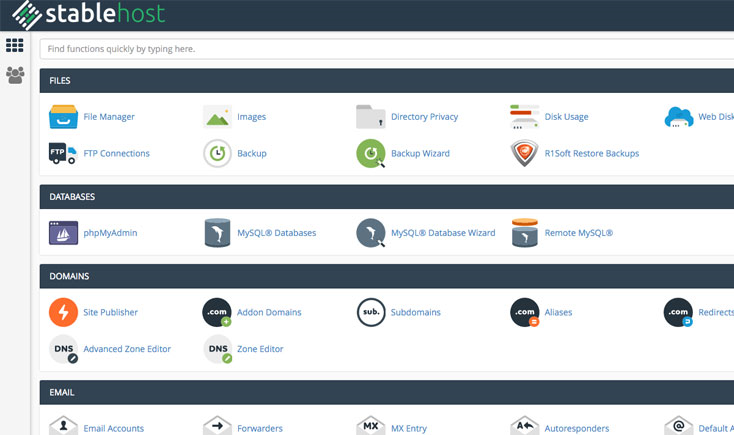
StableHost, on the other hand, employs cPanel for its shared and reseller hosting, and SolusVM for VPS hosting. Both control panels are user-friendly and widely recognized for their ease of use. cPanel offers an extensive range of features suitable for users of all technical backgrounds, while SolusVM caters well to those managing VPS servers. StableHost also includes Site.Pro Web Builder for those who prefer a drag-and-drop website creation experience, which can be especially beneficial for users with minimal technical expertise.
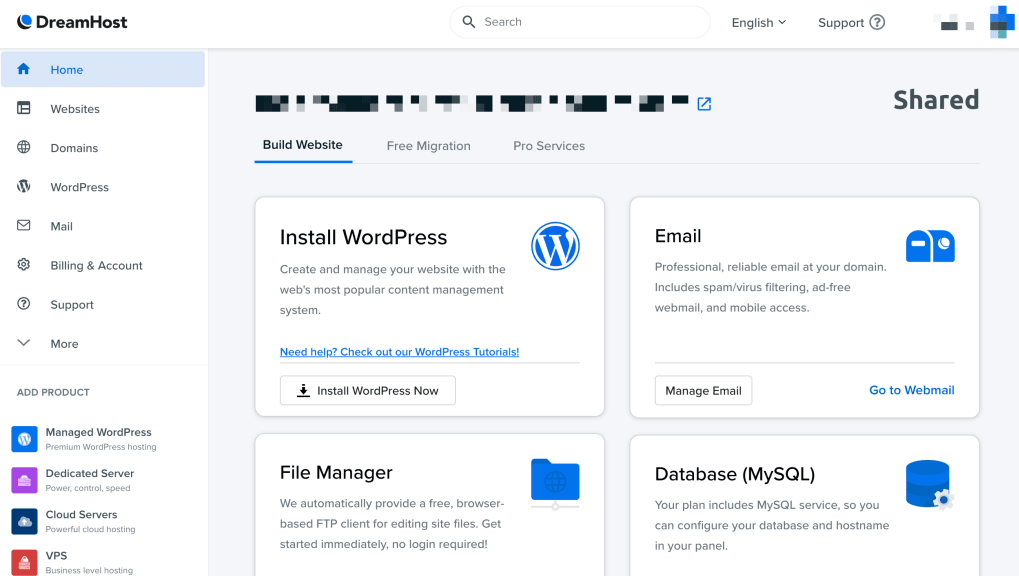
Both hosting providers offer tools for site migration. DreamHost makes migration seamless with its Migration Dashboard, which automatically scans your site and presents migration options. This service is integrated into the account panel and provides a guided process to complete the migration. StableHost offers similar capabilities but typically requires manual intervention through their help center. Users can access one-click installers and other features, although this might involve extra steps compared to DreamHost’s more automated approach.
DreamHost’s help center is extensive, featuring a massive, searchable archive of guides, FAQs, and tutorials. Their 24/7/365 support includes chat and email options with highly trained, U.S.-based experts, many of whom are WordPress contributors. StableHost also provides a comprehensive help center with articles on a wide range of topics, and 24/7/365 support, boasting an average response time of under 20 minutes. Both platforms offer great resources, but DreamHost’s support includes contributions from WordPress core developers, providing a slight edge in expert assistance.
User management
accessibility.
Score Components:
- Role customization (40%): Flexibility in creating and defining user roles and
permissions. - Ease of management (30%): User interface and tools for managing users.
- Access control (20%): Effectiveness of access control measures for different user
levels. - Scalability (10%): Ability to manage a growing number of users efficiently.
 8.1
8.1
 0
0
🏆 Winner DreamHost: An all-encompassing hosting solution with exceptional user management features.
When comparing DreamHost and StableHost in terms of managing user roles, permissions, and accessibility, DreamHost stands out by offering a comprehensive range of features. DreamHost provides the ability to grant unlimited SFTP users, enabling multiple users to have secure logins for data access. Moreover, features like SSH access for secure remote command-line operations and a custom-built, intuitive control panel highlight DreamHost’s commitment to flexible and efficient user management. Unfortunately, specific information about user management for StableHost is not available, limiting the comparison to the robust feature set offered by DreamHost.
In terms of user interfaces and tools for managing users, DreamHost excels with its custom-built control panel that brings together management of domains, mail, FTP & SSH, and support services in one user-friendly interface. The control panel is designed to be accessible even to novice users while still providing advanced tools for more experienced users. On the other hand, without detailed information on StableHost’s user management interfaces, it’s difficult to make an accurate comparison, but DreamHost’s cohesive and streamlined control panel sets a high standard.
For access control measures and the capability to manage a growing number of users, DreamHost provides extensive options like password protection using .htaccess, access to raw log files for performance analysis, and features like Crontab for automated job scheduling. These tools ensure that users can effectively manage access and operational needs as their number of users increases. The inclusion of a Subversion repository for collaborative projects further emphasizes its suitability for growing teams. There is no available information to assess StableHost’s effectiveness in this area, again favoring DreamHost in terms of detailed offerings.
DreamHost user roles table:
| Role | Description | Access highlights |
|---|---|---|
| SFTP User | Access for secure file transfer via SFTP | Securely transfers files to and from the server |
| SSH User | Command-line access for advanced operations | Execute remote commands, manage server operations |
| Control Panel Admin | Full administrative access to the control panel | Manage domains, email accounts, FTP & SSH, support requests |
| Subversion User | Collaborative project management in SVN | Access to source code management and version control |
| Crontab Scheduler | Automated tasks execution using Cron | Schedule and automate script executions and maintenance tasks |
| Email User | Professional email account with domain-based email | 25GB storage, spam filtering, ad-free webmail, mobile sync |
Customer support
hosting provider.
Score Components:
- Support communication channels (30%): Measures the variety of customer support types
provided (live chat, chatbot, email, phone, etc.) - Availability (20%): Assesses the availability hours for each channel, including 24/7
support options. - Technical support quality (30%): Assesses whether the provider offers comprehensive
technical support, including hardware upgrades (e.g., HDD to SSD), software installations, and web
server configuration changes. - Enterprise support (20%): Checks if there are dedicated or priority support services
for enterprise-level customers.
 8.3
8.3
 7.6
7.6
🏆 Winner DreamHost: DreamHost offers a wide range of support options around the clock, catering particularly well to those who need prompt and continuous assistance.
 |
 |
|
|---|---|---|
Phone support |
||
Live chat support |
||
Chatbot |
||
Email/ticket support |
||
Enterprise support (dedicated agent, priority support) |
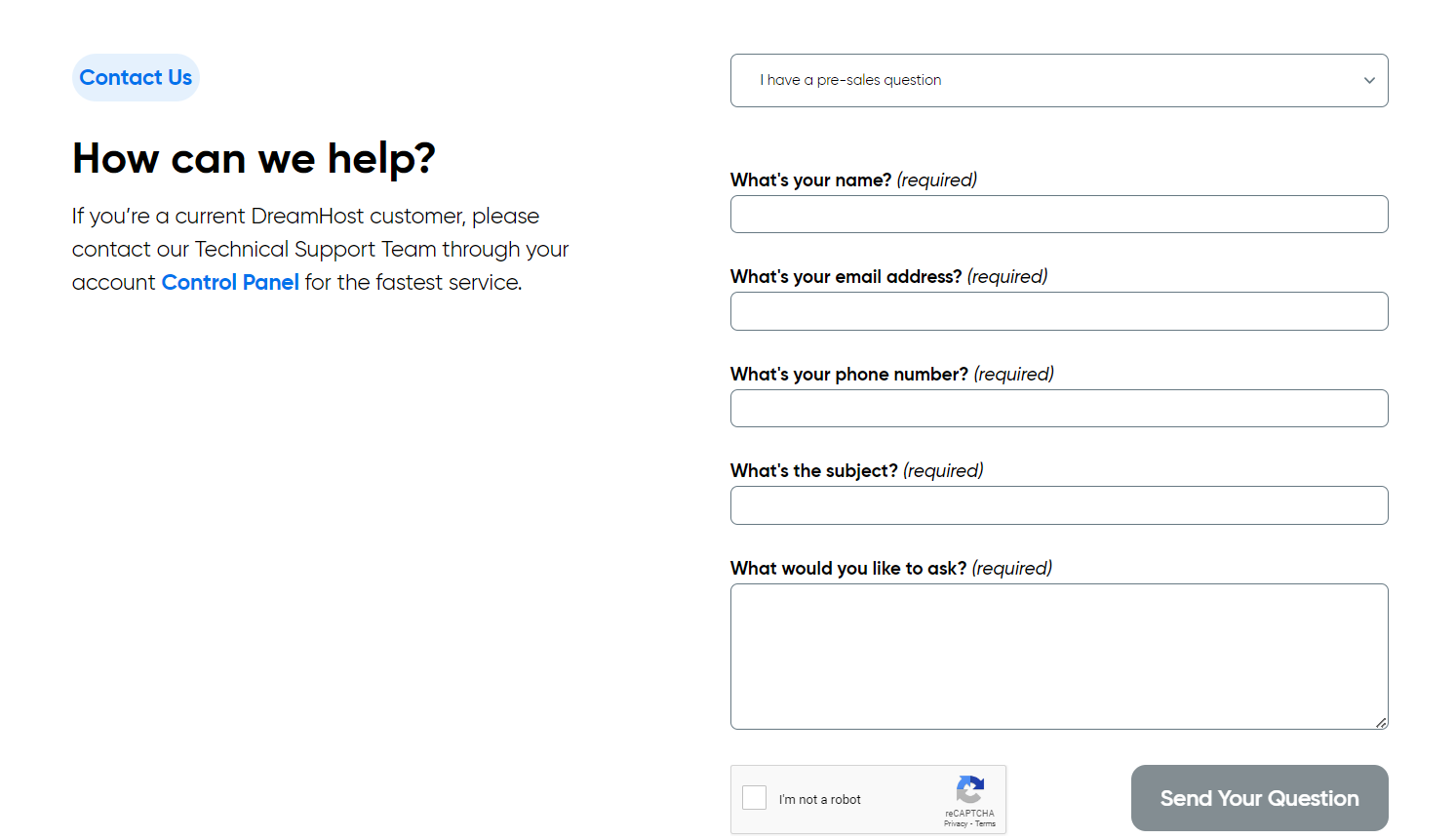
DreamHost excels in customer support availability, offering 24/7 options through live chat, email, and ticket systems, with the additional advantage of quick response times. Users also have access to a comprehensive knowledge base and support in both English and Spanish. DreamHost lacks direct phone support but offers callbacks for an additional fee, which may be a drawback for some users.

StableHost provides solid customer support with 24/7 technical assistance through phone, email, and live chat. They offer more direct phone support compared to DreamHost but do not provide chatbot options or enterprise-level support like dedicated agents or priority support. Their sales and billing teams are available during business hours, which might be limiting for users needing help outside of this timeframe. Overall, DreamHost’s more comprehensive support options give it a slight edge over StableHost.
Dreamhost vs StableHost: User feedback
DreamHost receives praise for its proactive updates, reliable performance, and a range of hosting options at competitive prices. Users appreciate its intuitive web portal, comprehensive end-to-end domain management tools, and competent customer service, particularly in resolving issues. However, the platform’s technical support is often criticized for slow responses, particularly the lack of phone support, and occasional downtime issues. Despite these drawbacks, many users remain loyal due to the affordability, ease of use for beginners, and strong uptime guarantees, although some have experienced more significant challenges and dissatisfaction.
StableHost receives high praise for its reliable performance and excellent customer support, often described as prompt and helpful. Users appreciate its ease of integration, comprehensive setup guides, and rich feature set, making it an ideal choice for both novice and advanced users. While some advanced users find certain functionalities lacking and note higher pricing compared to budget-friendly options, the overall consensus is positive due to its strong uptime and user-friendly interface. The plans are seen as reasonably priced, especially with available discounts, though some users miss the immediate tech support response times of the past.
Dreamhost vs StableHost: FAQ
Which platform is better suited for hosting WordPress websites?
DreamHost is better suited for hosting WordPress websites due to its optimized WordPress hosting plans, including DreamPress, which offer advanced features like built-in caching, automated daily backups, and specialized support. StableHost provides basic WordPress hosting but lacks the same level of optimization and advanced features offered by DreamHost. Therefore, DreamHost is the superior option for WordPress hosting.
Are both platforms suitable for beginners?
Both DreamHost and StableHost are suitable for beginners, each offering user-friendly interfaces and support resources. DreamHost uses a custom-built control panel that is intuitive and easy to navigate, making it accessible for users with limited technical expertise. StableHost utilizes cPanel, which is also user-friendly and widely recognized in the industry, making either platform a good choice for beginners.
Which hosting service offers better security features?
DreamHost offers robust security features, including free SSL certificates through Let’s Encrypt, DDoS protection, malware scanning with DreamShield, and RAID 1 storage. StableHost also provides strong security measures, including various SSL certificates, thorough security audits, and additional VPN services. Both platforms excel in security, but DreamHost’s comprehensive features and additional options like SSH access give it a slight edge.
What are the major differences in pricing and value between DreamHost and StableHost?
DreamHost and StableHost have different pricing strategies and value propositions. DreamHost offers a variety of hosting plans with features like unlimited storage, free domain registration, and automated backups across most plans, starting at $5.99/month. StableHost provides more affordable entry-level options, such as its Mini plan starting at $1.50/month, but may charge for additional features like SSH access. Both have competitive pricing, but DreamHost generally provides more comprehensive features for higher-tier plans.
Which hosting service offers more scalability options for growing websites?
DreamHost offers excellent scalability with options to expand RAM and storage seamlessly, making it easy to upgrade as a website grows. Their dedicated and VPS hosting plans cater well to scaling needs without requiring a plan switch. StableHost provides performance enhancements like automatic node failover and smart load balancing but lacks detailed information on elastic scaling options. Overall, DreamHost offers more robust scalability features for growing websites.
The making of this blog
We followed a clear, step-by-step process to write and research this article.









